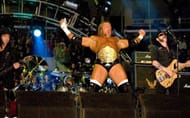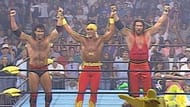
Let's be honest - pro wrestling is pretty much 80-85% entrances. Maybe 75%. I dunno. I'm not very good at math. My point is, entrances are very important to the whole presentation of the show. I mean, do you know what wrestlers had to do to hype up the crowd before they had the elaborate entrance productions they have now? Me either. How old do you think I am, anyway?
As we all know, you can't have an entrance without music. Well, you can, I suppose, but nobody will like it. Unless you're Tommaso Ciampa. And you're not Tommaso Ciampa, now are you?
By the way, if you are Tommaso Ciampa, please email me. Thank you.
10 WWE Stars Who Are Now Banned - Find Out Now!
Wrestling theme songs are like pizza - even when they suck, they're still pretty good. That's actually not true, I had the worst pizza ever at this water park in Cincinnati and... sorry.. off-topic... Now, in this day and age, when you can buy music instantly and digitally, wrestling music actually sells pretty well. Bray Wyatt's new theme song, "Let Me In", has actually done very well on the iTunes charts for example (more on that later).
But, then you have the songs that just seem to get into public consciousness - where even non-wrestling fans can hear it and recognize it. Of course, that's to varying degrees, but it still happens.
So, hey, what do you say we look at five of those songs now? These songs were written specifically as the theme music for a wrestler - not an existing song used later as an entrance theme - that, in one way or another, became popular outside of sports entertainment. That doesn't mean they flew up the charts necessarily. But they all gained some sort of cultural significance outside of, as Tony Schiavone would say, our great sport.
(By the way, welcome back, Tony. Sincerely.)
#5 Real American (by Rick Derringer) - Hulk Hogan
Hulk Hogan is probably the most recognizable pro wrestler to have ever performed. That's hardly a debate.
Most successful? That could be debatable. But, to this day, people still associate the Hulkster and pro wrestling together, whether they know anything about wrestling at all. How much so? Even if they aren't fans, when they hear this song...
... they know exactly who to associate it with.
The song is actually written and performed by musician and producer Rick Derringer, who was famous for a little bit in the 1970s and 80s, I swear.
Now, "Real American" was never a huge seller (plus Derringer's theme music for Demolition was way better), but, like Hogan, it still holds a place in the public's imagination. Whenever, in media, you need to demonstrate just how American someone is, this is the song they usually go to.
I'm not kidding. This goes all the way to the top.
In April of 2011, then-US President Barack Obama was about to speak at the White House Correspondent's Dinner - an event usually known for its light-hearted tone, where the President will usually give a humorous speech. It's actually above, and it's pretty funny. Check it out.
I don't want to get into the details of "birtherism" and Obama's birth certificate and all of that, because this is a sports website, but let's just say some people question whether the President was born in the United States (he was). So, a day or two before the dinner, President Obama released his long-form birth certificate to the media. Which was the perfect opportunity to open his speech with Hogan's theme music.
#4 "Badstreet USA" (by Michael P.S. Hayes) - The Fabulous Freebirds
"I want to tell you a story about a place you don't wanna be. This ain't no home sweet home, it's a home sweet misery."
In 1984, Michael P.S. Hayes, one-third of the Fabulous Freebirds in Dallas, TX's World Class Championship Wrestling, decided that as a rock n' roll tag team, they needed a rock n' roll theme song. So, they got one. "Freebird" by Lynyrd Skynrd. Obviously>
Aaaaaand, they also had to pay royalties for it. So, Hayes decided to write his own tune. And, so he did. "Badstreet USA".
It may quite possibly be the very first wrestling theme song written just for that specific purpose. If not, it was popular enough that not only did it become an "underground hit", as a Dallas Observer story on the documentary Back On Badstreet said, but...
it was popular enough in the wrestling circuit that it made original theme songs a must for every Speedo-wearing body slammer who followed in his footsteps.
While it never became a Billboard-charting hit, in the areas where the Freebirds wrestled, it actually sold pretty well - and not just among wrestling fans. This was just the kind of rock song popular in the 70s and it was actually really well performed and produced.
Even today, "Badstreet USA" if fondly remembered, not just by wrestling fans, but fans of Southern Rock of the 1970s
#3 "The Game" (by Motorhead) - Triple H

It's not uncommon, as we saw earlier, for an established, popular music act to write, produce and perform a theme song for a WWE Superstar. But, few of those acts have the prestige and popularity of hard rock legends Motorhead.
How much clout does Triple H have? He didn't get Lemmy and the boys to record one theme song for him - he got them to write and record three of them. "The Game", "King of Kings", and "Line in the Sand", the theme music for Evolution.
But it's "The Game" I want to talk about here, as it's not only the song most associated with, well, The Game, but it's also become one of the band's most recognizable songs.
"The Game" was released on Motorhead's 2002 album Hammered (get it? Because Triple H uses a slidgeham... ugh, forget it) and, obviously, performed by the band, but it was actually written by long-time WWE composer Jim Johnston.
Since then, and up until Lemmy Kilmister's death in 2015, the song was a regular staple of their live shows (which I was so fortunate enough to see in 2014 in Austin, TX).
"The Game" might not be familiar to millions in general, but it's familiar to millions of both WWE and Motorhead fans alike, even when those two fandoms don't cross over. So, therefore, it deserves a place on this list.
Plus... I mean... just listen to it...
#2 "Rockhouse" - New World Order

It's important to remember just how popular professional wrestling was in the late 1990s. It might have been a cultural curiosity (albeit it a successful one) during the Rock 'N Wrestling Connection in the 80s, but that's nothing compared to the Attitude Era. Which we're calling because there isn't a better name for it. Can you think of a better name? Go to the comments section and maybe we'll use it next time.
While Stone Cold Steve Austin and The Rock might be the icons that people think of when it comes to this era in wrestling, you have to remember just how big the New World Order in WCW was.
The nWo (and, yes, you are legally required to spell it that way - I don't make the rules, sorry) was the group, and the angle, that really propelled World Championship Wrestling into the stratosphere. People - kids, especially - were constantly wearing nWo t-shirts everywhere. And the nWo theme song - "Rockhouse" - was probably the most recognizable theme song in wrestling at the time.
The song, as great as it was, didn't move Q rating levels all by itself. The cultural phenomenon of the nWo can be thanked for that. Even now, though, professional baseball players come to the plate to "Rockhouse", for example. And anyone who watched wrestling - heck, anyone who watched television - in the 1990s know that theme music.
#1 "Chachalala" (by Joe Johnston) - Fandango
They called it "Fandango-ing."
In 2012, the man formerly known as Johnny Curtis (winner of the second season of NXT, back when NXT was that sort of thing), returned to the main roster as Fan-DAN-Go (or just, you know, Fandango), a ballroom dancer who was also a wrestler. You know, like back in the 1980s when all wrestlers in WWE had an "actual" job, like prison guard or garbage man.
it was reportedly a "pet project" of Vince McMahon and presented as a heel because McMahon figured everyone would hate him because he was... good at dancing? That seemed to be it.
On the contrary, fans actually ate the character up - especially his catchy theme song, "Chachalala", written by the aforementioned Joe Johnston (who, by the way, really should be in the WWE Hall of Fame). Footage of fans after events singing and dancing to the song was seen all over YouTube - like this footage:
Fans weren't just singing it, however. They were listening to it, too. I mean, not just at WWE shows but, like, on their iPods and phones and such. Especially in the UK, where the song reached #11(!) on that country's iTunes chart.
Fans simply couldn't get enough of this dancin' fool. Cue Frank Zappa.
Sadly, while WWE is usually good at capitalizing on moments from their stars that go mainstream (look at all the high school, college, and pro sports teams that jumped on Daniel Bryan's "Yes" chants, for example), this one didn't really go very far. While WWE certainly hyped up the cultural phenomenon following the week of WrestleMania 29, they still decided to keep Fandango himself a heel, rather than play up his newfound popularity.
It's been a rocky road for 'Dango since then, who recently debuted on the good NXT (the one everyone likes, not the game show which... doesn't exist anymore so I imagine that would have been difficult), reuniting with his Breezango/Fashion Police partner Tyler Breeze after recovering from an injury... and looking pretty badass, too, let's be honest.
But, no matter what happens in his career from here on in, he will at least be able to say that he had buses and trains and arenas full of people singing and dancing to a song written specifically for him. And that's got to be pretty amazing.
Make Sportskeeda your preferred choice for WWE content by clicking here: Source preferences

